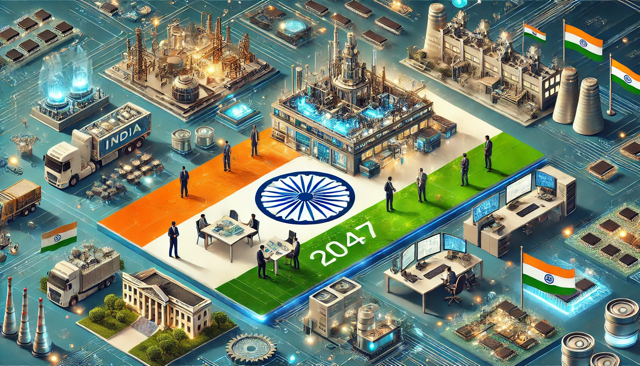Viksit Bharat 2047: India Must Develop Its Own Chipset Value Chain, Says S Krisnan
Published: 8.12.2024
At the recent Viksit Bharat 2047 summit, technology expert S Krisnan underscored the importance of India developing its own chipset value chain. As India aspires to become a global technology leader by 2047, creating a self-reliant semiconductor ecosystem is crucial for national security, economic growth, and technological advancement.

Semiconductors are essential to modern technology, powering innovations in smartphones, laptops, automotive systems, and more. Currently, India depends heavily on imports for its semiconductor needs, which makes the country vulnerable to global supply chain disruptions and geopolitical issues.
S Krisnan pointed out the recent global chip shortage as a clear signal for India to speed up its efforts in building a robust semiconductor manufacturing and supply ecosystem. “The chip shortage has highlighted the strategic importance of having an indigenous value chain for chipsets. To truly achieve Atmanirbhar Bharat, we need to control the entire semiconductor production lifecycle—from design to manufacturing to distribution,” he said.
Investment in research and development is crucial for driving innovation in semiconductor technology. This includes developing advanced chip designs, improving fabrication processes, and exploring new materials. Establishing state-of-the-art semiconductor fabrication facilities, or fabs, is vital. India needs to create the necessary infrastructure to support large-scale manufacturing and testing of chipsets.
A highly skilled workforce is essential for advancing the semiconductor industry. This involves enhancing engineering education, providing specialized training, and encouraging collaboration between academia and industry. The government must create a supportive policy environment that includes financial incentives, subsidies, and regulatory support to attract both domestic and foreign investments in the semiconductor sector. Collaboration between the government, private sector, and academia can accelerate the development of the semiconductor ecosystem. Public-private partnerships can facilitate knowledge transfer, resource sharing, and coordinated efforts towards common goals.
Building an indigenous chipset value chain is not only about achieving technological independence but also about positioning India as a global leader in the semiconductor industry. S Krisnan’s vision for Viksit Bharat 2047 outlines a comprehensive strategy to achieve this goal, emphasizing collaboration, innovation, and strategic investments.
The Indian government has already taken significant steps towards this vision, including the recent launch of the Production Linked Incentive (PLI) scheme for semiconductors and the establishment of a dedicated semiconductor mission. These initiatives aim to attract leading global semiconductor companies to set up operations in India, thereby boosting domestic production capacity.
As India approaches its centenary in 2047, building a self-reliant chipset value chain will be fundamental to its technological and economic progress. S Krisnan’s call to action at the Viksit Bharat 2047 summit highlights the urgent need for a national effort to achieve semiconductor sovereignty. By leveraging its strengths in innovation, skilled manpower, and strategic policy support, India can become a powerhouse in the global semiconductor industry, ensuring sustainable growth and technological leadership for years to come.


.png)

